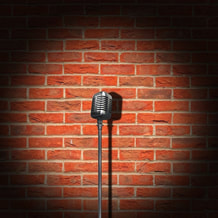|
by Emily Nolan  The old saying attributed to Lucille Ball that “comedy can’t be taught, you either got it or you don’t” is outdated, to say the least. It’s clear that a lot has changed since the I Love Lucy era. In the past decade, comedy has started to creep its way into the world of research and academia. There has been extensive research on the benefits of comedy, the reasons comedy makes people laugh, and the most effective structure of jokes, and comedic storytelling. Comedy or the act of laughing has been proven to stimulate your organs due to an increase of oxygen-rich air coming into your body, improve your immune system, and lessen feelings of anxiety or depression. While humor may not cure every ailment, the idea that laughter is the best medicine is not too far-fetched. Comedy can also be looked at as a vital tool in the classroom, as it can act as a key instrument in explaining complicated issues and ideas, it can lead to further retention from students.  Regardless of the many benefits both universally and in the classroom, and the recognition that studying comedy can lead to a career as lucrative as studying any other form of creative writing (unlike what Lucille Ball thought to be true), comedy is still not looked upon by institutions of higher education as a serious form of study. Jack Lemmon coined the phrase: “Dying is easy, comedy is hard,” which speaks to the immense skill, and dedication one must have to learn comedy theory. Comedy theory is divided into two categories: why people laugh, and what joke structure is the most successful. Some of the many theories that focus on “why people laugh” include; superiority theory, incongruity theory, and relief theory. While specific “joke structure” models consist of; reversals, triples, benign retaliation, broken assumptions, and misplaced sincerity, to name a few. Not to disclude the several genres of comedy encompassing; stand-up, sitcoms, satire, parody, and farce. It’s clear that for those who are passionate, there is a lot to be studied in this field, and comedy deserves a place in academia. A comparison worthy of note is to look at the treatment of poetry in contrast to that of comedy. Considering the two art forms in historical context, comedy, as well as poetry, were once viewed as kindred. Aristotle posited that comedy and poetry are inherently similar in nature by his thoughts in Poetics, where he notes that they are both centered in humanistic imitation. Even as modernization got a hold on the artforms, they still utilize similar linguistic and semantic elements. Humorists and poets alike both rely on tension being built through emotional ties, imagery, surprise, and verbal irony to ensure memorability, and drive forth meaning. They also use their words very deliberately, aware that their chosen art form is diluted when overexplaining, acute similarity or clichés are present. Surprisingly, in comparing a haiku to a triple it is stunningly evident how structurally similar these very different genres are. The two modes, both three lines in length, depend on a three part format of; the setup, the anticipation, and the punchline. Yet, regardless of the similarities in the historical and current context, poetry has its place in higher education institution creative writing programs while comedy is unequivocally left out.  An explanation may be found by comparing pedagogies. Poetry pedagogy is rich in abundance while comedy pedagogy is on the precipice of basic origin in collation. Poetry often has a high focus in creative writing programs whereas comedians consider themselves lucky if they get one to two classes dedicated to comedy. And as mentioned above, one or two classes can not encompass all there is to learn, and may not focus on someone’s comedic niche or specialization. Certain institutions are at the forefront of comedic study. Emerson College has provided a great example of what a Bachelor of Fine Arts in Comedic Arts could look like, as it is the first degree of its kind offered in the United States. The students have the opportunity to take classes based in theory and practical application, which is exactly what I’ve been hoping and campaigning for. However, Emerson and many of the institutions following their lead cost over $45,000 a year to attend with financial aid, not including housing. Depending on the institutions’ location this can skyrocket the price to $60,000 per year, totaling to an astounding $160,000 for the degree. Emerson College’s student demographics are 60% white and mainly male, which is disappointing but not at all surprising. There is an obvious inclusivity issue present as these institutions historically support the upper class, white man. How will anyone, other than those whom these programs were designed for, have an impact in comedy or even a fair chance if the starting lines are wildly differing? The current players in American stand-up comedy are (Ding, ding, ding! You’ve guessed it!) 85.2% male, and 62.3% white. Without diversity in comedy, how will we be able to construct fresh theories, and pedagogies to guide the next generation of trailblazers? How will we ever evolve? It is my belief that if smaller, more affordable institutions incorporated comedy as a more available focal point in their creative writing programs, we may gain some key hilarious humans in the comedic movement, and those are needed! Comedy is universally enjoyed. It too should be able to be universally studied by all that are interested in its pursuit--especially those who have been taught that comedy has no place for them.
0 Comments
Leave a Reply. |
Archives
July 2024
Categories
All
|
|
Glassworks is a publication of Rowan University's Master of Arts in Writing 260 Victoria Street • Glassboro, New Jersey 08028 [email protected] |
All Content on this Site (c) 2024 Glassworks
|

 RSS Feed
RSS Feed
